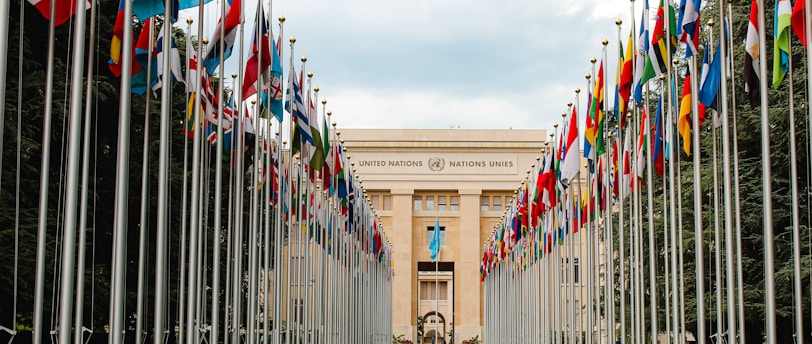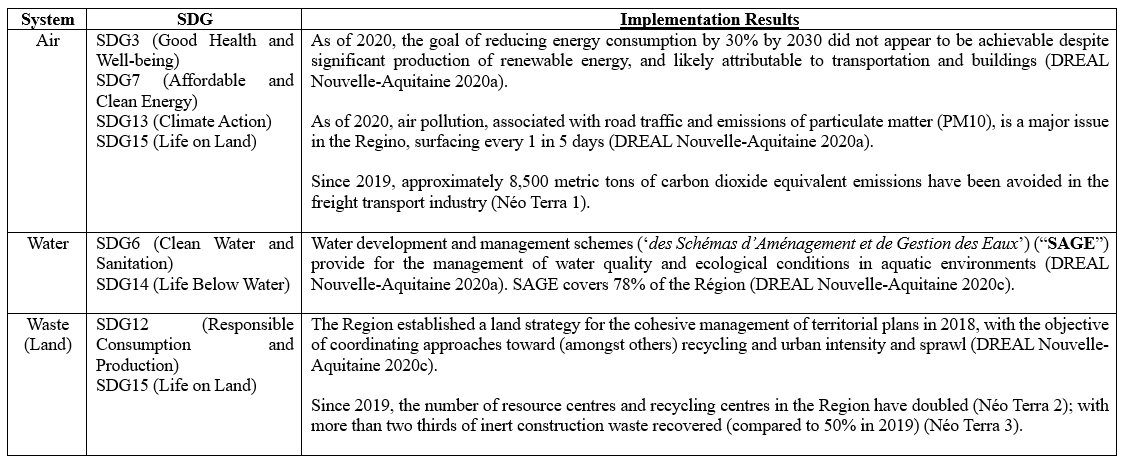Implementation of Waste- and Pollution-Specific UN Sustainable Development Goals in Nouvelle-Aquitaine, France
11/25/20232 min read


In 2015, the United Nations (“UN”) set out 17 sustainable development goals (“SDGs”) by way of the 2030 Agenda for Sustainable Development, which goals were adopted by the French Republic in its capacity as a UN member state (UNDESA).
In the Région of Nouvelle-Aquitaine, the Regional Directorate for the Environment, Planning, and Housing (‘Direction régionale de l’Environnement, de l’Aménagement et du Logement’) (“DREAL Nouvelle-Aquitaine”) executes the policies of the Ministries of Ecological and Inclusive Transition and Territorial Cohesion (‘des ministères de la Transition écologique et solidaire et de la Cohésion des territoires’), and is also responsible for inter alia protecting water, air quality, biodiversity, and ground resources (DREAL Nouvelle-Aquitaine 2017).
Further, in 2019, the Region adopted the energy and ecological roadmap to transition known as Néo Terra, which seeks to support progress in energy, ecology, and agriculture by 2030 (Néo Terra 1); in other words, in alignment with the 2030 agenda of the UN SDGs.
In relation to the SDGs (‘Objectifs de Développement Durable’ or “ODD”), the Région consolidates the SDGs thematically into 6 regional objectives (DREAL Nouvelle-Aquitaine 2020b).
The objectives relevant to waste management and environmental pollution are:-
Regional objective no. 2: A transformation of models of territorial development to act in favor of the climate and biodiversity (SDG Nos. 7, 13, 14, 15) (‘Une transformation des modèles de développement territoriaux pour agir en faveur du climat et de la biodiversité (ODD nos 7, 13, 14, 15)’); and
Regional objective no. 5: Sustainable urban transformation through economical management of resources and the implementation of appropriate services (SDG Nos. 6, 9 and 11) (‘Une transformation urbaine durable par une gestion économe des ressources et la mise en place de services adaptés (ODD nos 6, 9 et 11)’).


References:
Direction régionale de l’Environnement, de l’Aménagement et du Logement Nouvelle-Aquitaine (“DREAL Nouvelle-Aquitaine”). (2017). ‘Version texte de l’infographie : La DREAL du quotidien’. 7 August 2017. https://www.nouvelle-aquitaine.developpement-durable.gouv.fr/infographie-la-dreal-du-quotidien-a9751.html?lang=fr
DREAL Nouvelle-Aquitaine. (2020a). September 2020. ‘Objectif régional n°2: Une transformation des modèles de développement territoriaux pour agir en faveur du climat et de la biodiversité (ODD nos 7, 13, 14, 15)’. https://www.nouvelle-aquitaine.developpement-durable.gouv.fr/IMG/pdf/200929_fiche_ordd_2_vf.pdf
DREAL Nouvelle-Aquitaine. (2020b). ‘Les outils ORDD’. 30 September 2020. https://www.nouvelle-aquitaine.developpement-durable.gouv.fr/les-outils-ordd-a11703.html?lang=fr
DREAL Nouvelle-Aquitaine. (2020c). ‘Objectif régional n°5 : Une transformation urbaine durable par une gestion économe des ressources et la mise en place de services adaptés (ODD nos 6, 9 et 11)’. 30 September 2020. https://www.nouvelle-aquitaine.developpement-durable.gouv.fr/IMG/pdf/200929_fiche_ordd_5_vf.pdf
Néo Terra 1. ‘Ambition 5: Se déplacer et habiter dans des territoires adaptés aux changements climatiques’. https://www.neo-terra.fr/quest-ce-que-neo-terra/ambition-5-mobilites-habitat/
Néo Terra 2. ‘Ambition 1 : Reconstituer les ressources naturelles pour l’avenir’. https://www.neo-terra.fr/quest-ce-que-neo-terra/ambition-1-ressources-naturelles/
Néo Terra 3. ‘Ambition 4: Innover pour une économie responsable et décarbonée’. https://www.neo-terra.fr/quest-ce-que-neo-terra/ambition-4-economie/
Néo Terra 4. ‘Qu’est-ce que Néo Terra?’ https://www.neo-terra.fr/quest-ce-que-neo-terra/
United Nations Department of Economic and Social Affairs (“UNDESA”). ‘The 17 Goals’. https://sdgs.un.org/goals#history